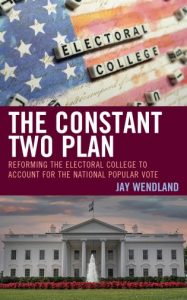 Jay Wendland, an associate professor of political science at Daemen University, has published a book exploring a novel approach to reforming the Electoral College.
Jay Wendland, an associate professor of political science at Daemen University, has published a book exploring a novel approach to reforming the Electoral College.
Wendland said “The Constant Two Plan: Reforming the Electoral College to Account for the National Popular Vote,” released earlier this month, started as a paper in grad school exploring the role of states in national elections. With time and more in-depth research, his arguments evolved and he’s become a bigger proponent of the national popular vote.
“The United States prides itself on democratic decision-making, but relies on an antidemocratic institution that has been incredibly resistant to reform, despite over 700 attempts, to select its president,” said Wendland, who also serves as the History and Political Science Department chair. “Throughout the book, I provide the reasoning behind the creation and adoption of the Electoral College along with many of the proposed reform plans that have been offered, but failed to get adopted.”
Instead, Wendland believes a new idea is needed, adding, “I offer a novel way forward: awarding two votes from each state to the national popular vote winner with the remaining votes awarded based on state-level results, thus accounting for the national will while also preserving the federalist principle many have come to associate with the Electoral College.”
The research for the book was done off and on over a decade. Wendland took a sabbatical during the fall 2022 semester to focus on writing.
“I am very happy to see this book finally out in print,” he added. “It started as a research paper in a graduate seminar more than ten years ago, so seeing it in print is incredibly rewarding.”
In 2017, Wendland published “Campaigns that Matter: The Importance of Campaign Visits in Presidential Nominating Contests.” He said plans are already in the works for a third book in which he and a co-author will examine Ranked Choice Voting (RVC) and whether it’s improving feelings of representation or not.
